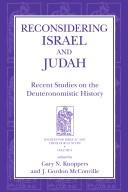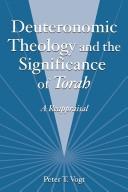| Listing 1 - 3 of 3 |
Sort by
|
Book
ISBN: 9789004324381 9004324380 9789004324398 9004324399 Year: 2016 Volume: 95 Publisher: Brill
Abstract | Keywords | Export | Availability | Bookmark
 Loading...
Loading...Choose an application
- Reference Manager
- EndNote
- RefWorks (Direct export to RefWorks)
J. Cornelis de Vos examines the impact and reception of the Decalogue up to 200 CE, scrutinizing the versions of the Decalogue, and the history of the Decalogue in ancient Jewish writings, the New Testament, and early Christian writings. Almost all texts show an interconnection of identity and normativity: the Decalogue functions as an expression of fundamental moral concepts of socio-religious groups. At the same time, these groups enhance the Decalogue with normativity—sometimes even expanding on it—to make it a text that generates their own identity. This is the first study that presents an in-depth and continuous analysis of the early history of the Decalogue. Der Wirkung und Rezeption des Dekalogs bis 200 n.Chr. widmet sich J. Cornelis de Vos in dieser Studie. Dafür erforscht er zunächst die alten Textzeugen der beiden Dekalogfassungen, um anschließend zu fragen, wie die Zehn Gebote bei antik-jüdischen Autoren, im Neuen Testament sowie in frühchristlichen Schriften aufgenommen wurden. Es zeigt sich eine Verbindung von Normativität und Identität: Der Dekalog gilt zumeist als Ausdruck der moralischen Grundauffassungen sozioreligiöser Gruppen; er wird gleichzeitig von diesen Gruppen mit Normativität aufgeladen – manchmal sogar erweitert – gerade um als Identität stiftend für die eigene Gruppe zu gelten. Dies ist die erste Studie, die eine detaillierte und durchgehende Geschichte des Dekalogs in der Antike beschreibt.
241.6 --- 222.4 --- 222.4 Deuteronomium --- 222.4 Le Deuteronome --- Deuteronomium --- Le Deuteronome --- 241.6 Decaloog. Tien geboden --- Decaloog. Tien geboden --- Ten commandments --- Bible. --- Commandments, Ten --- Decalogue --- Criticism, interpretation, etc., Jewish --- History. --- Criticism, interpretation, etc. --- History --- Versions. --- Ten commandments. --- 30-600 --- Early Church Period --- Primitive and Early Church Period --- History |y Early church, ca. 30-600.

ISBN: 1575065185 9781575065182 157506037X 9781575060378 Year: 2000 Publisher: Winona Lake, Ind. Eisenbrauns
Abstract | Keywords | Export | Availability | Bookmark
 Loading...
Loading...Choose an application
- Reference Manager
- EndNote
- RefWorks (Direct export to RefWorks)
The Deuteronomic or, more properly, Deuteronomistic History is a modern theoretical construct which holds that the books of Deuteronomy, Joshua, Judges, Samuel, and Kings constitute a single work, unified by a basic homogeneity in language, style, and content. This construct owes much to the influence of Martin Noth’s classic study of the Deuteronomistic History, contained in his larger Uberlieferungsgeschichtliche Studien. According to Noth, the Deuteronomist incorporated the deuteronomic law into the beginning of his work, framing it with speeches by Moses. The Deuteronomist then added other sources, such as tales of conquest and settlement, prophetic narratives and speeches, official annals and records. While this larger thesis has stood the test of time, there is much disagreement among contemporary scholars about a wide variety of issues. The present collection attempts to provide readers with an understanding of the important developments, methodologies, and points of view in the ongoing debate. Both current essays and some older, classic essays that have shaped the larger debate are included. Ten are newly translated into English. Each essay is prefaced by a detailed foreword by one of the editors that summarizes and places the essay in its appropriate context, making the volume ideal for use in seminars or courses, as well as for individuals wishing to become familiar with the state of discussion on the Deuteronomistic History.
Deuteronomistic history (Biblical criticism)
---
Jews
---
Deuteronomic history (Biblical criticism)
---
Deuteronomists (Biblical criticism)
---
DH (Biblical criticism)
---
D document (Biblical criticism)
---
History
---
Historiography.
---
Bible.
---
Former Prophets
---
Neviʼim rishonim
---
Profetas primeros
---
Prophetae Priores
---
Criticism, interpretation, etc.
---
Deuteronomistisches Geschichtswerk.
---
Deuteronomistic history.
---
Bibel
---
Deuteronomistisches Geschichtswerk
---
Mose
---
Moses
---
Dtn
---
Deut
---
Dt
---
Devarim
---
Debarim
---
Deuteronomium
---
Deuteronomy
---
Deutéronome
---
<

ISBN: 1575065649 9781575065649 1575061074 9781575061078 Year: 2006 Publisher: Winona Lake, Ind. : Eisenbrauns,
Abstract | Keywords | Export | Availability | Bookmark
 Loading...
Loading...Choose an application
- Reference Manager
- EndNote
- RefWorks (Direct export to RefWorks)
One of the few areas of consensus in modern Deuteronomy scholarship is the contention that within the book of Deuteronomy there is a program of reform that was nothing short of revolutionary. Although there are divergent views regarding the specific details of this revolutionary program, most scholars agree that, in fundamental and profound ways, Deuteronomy was radical in its vision. This vision was expressed in key ideas: centralization of worship, secularization, and demythologization (of earlier traditions). However, Vogt argues that these ideas fail to account adequately for the data of the text of Deuteronomy itself. Instead, he claims, at the heart of Deuteronomic theology is the principle of the supremacy of Yahweh, which is to be acknowledged by all generations of Israelites through adherence to Torah. Thus, the book of Deuteronomy is in fact radical and countercultural but not in the ways that are usually adduced. It is radical in its rejection of ANE models of kingship and institutional permanence, in its emphasis on the holiness of life lived out before Yahweh, and in its elevation of Yahweh and his Torah.In the introductory chapter, the structure and ideology of the book are examined. Chapter 1 then examines some of the ways in which the theology of Deuteronomy has been understood, namely, in terms of centralization, secularization, and demythologization. Chapters 2–5 evaluate key texts that are used to support the idea that centralization, secularization, and demythologization are at the heart of the theology of Deuteronomy. An alternative reading of the texts is presented that highlights the supremacy of Yahweh and Torah. The final chapter investigates the theological and ideological implications of this alternative reading of key texts.
Bible.
---
Deuteronomium (Book of the Old Testament)
---
Deuteronomy (Book of the Old Testament)
---
Devarim (Book of the Old Testament)
---
Kitāb-i Divārīm (Book of the Old Testament)
---
Shinmeiki (Book of the Old Testament)
---
Sifr al-Tathniyah (Book of the Old Testament)
---
Sinmyŏnggi (Book of the Old Testament)
---
Tas̲niyah (Book of the Old Testament)
---
Tathniyah (Book of the Old Testament)
---
Criticism, interpretation, etc.
---
Theology.
---
222.4
---
Deuteronomium
---
HISTORY / Ancient / General.
---
Bible
---
Criticism, interpretation, etc
---
Theology
---
Thora.
---
Theologie
---
RELIGION
---
Religion, Primitive
---
Atheism
---
Irreligion
---
Religions
---
Christian theology
---
Theology, Christian
---
Christianity
---
Religion
---
Biblical Studies
---
Old Testament.
---
Bibel
---
Mose
---
Moses
---
Dtn
---
Deut
---
Dt
---
Devarim
---
Debarim
---
Deuteronomy
---
Deutéronome
---
<
| Listing 1 - 3 of 3 |
Sort by
|

 Search
Search Feedback
Feedback About
About Help
Help News
News